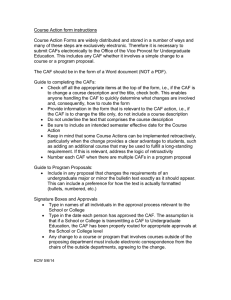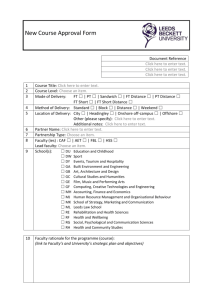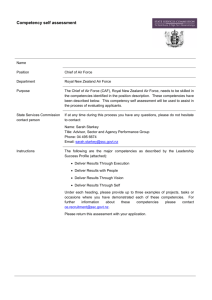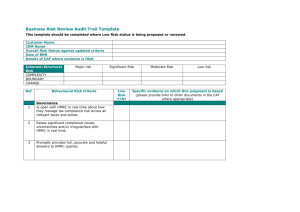CAF Policy Template THE SCOPE OF THIS CHAPTER:
advertisement
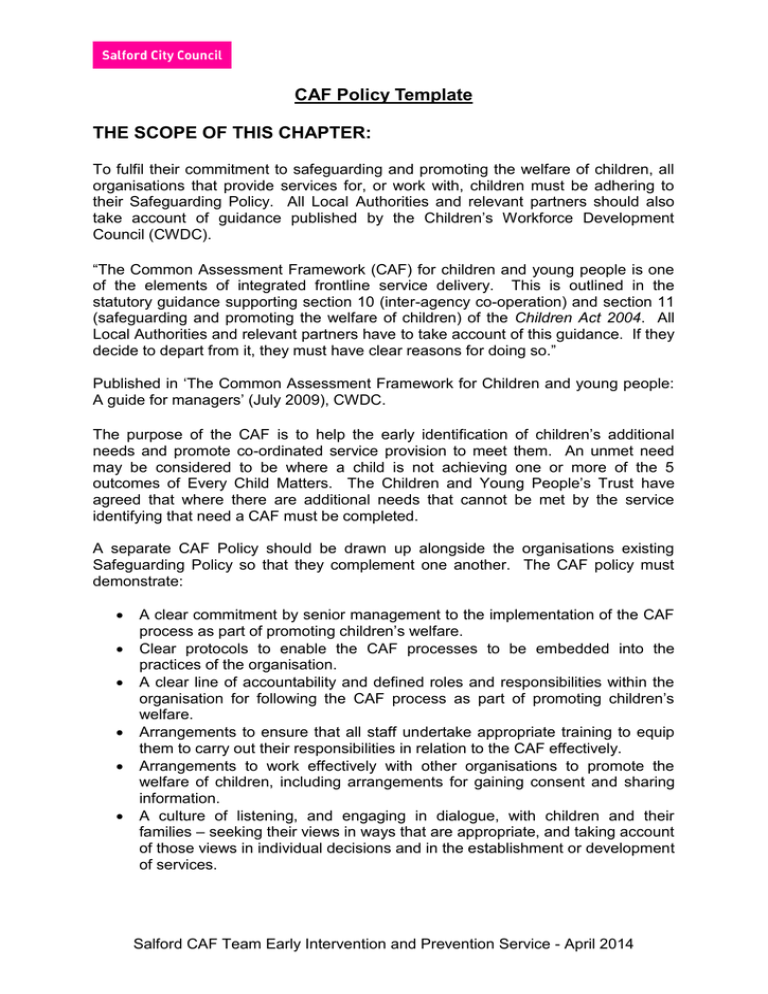
CAF Policy Template THE SCOPE OF THIS CHAPTER: To fulfil their commitment to safeguarding and promoting the welfare of children, all organisations that provide services for, or work with, children must be adhering to their Safeguarding Policy. All Local Authorities and relevant partners should also take account of guidance published by the Children’s Workforce Development Council (CWDC). “The Common Assessment Framework (CAF) for children and young people is one of the elements of integrated frontline service delivery. This is outlined in the statutory guidance supporting section 10 (inter-agency co-operation) and section 11 (safeguarding and promoting the welfare of children) of the Children Act 2004. All Local Authorities and relevant partners have to take account of this guidance. If they decide to depart from it, they must have clear reasons for doing so.” Published in ‘The Common Assessment Framework for Children and young people: A guide for managers’ (July 2009), CWDC. The purpose of the CAF is to help the early identification of children’s additional needs and promote co-ordinated service provision to meet them. An unmet need may be considered to be where a child is not achieving one or more of the 5 outcomes of Every Child Matters. The Children and Young People’s Trust have agreed that where there are additional needs that cannot be met by the service identifying that need a CAF must be completed. A separate CAF Policy should be drawn up alongside the organisations existing Safeguarding Policy so that they complement one another. The CAF policy must demonstrate: A clear commitment by senior management to the implementation of the CAF process as part of promoting children’s welfare. Clear protocols to enable the CAF processes to be embedded into the practices of the organisation. A clear line of accountability and defined roles and responsibilities within the organisation for following the CAF process as part of promoting children’s welfare. Arrangements to ensure that all staff undertake appropriate training to equip them to carry out their responsibilities in relation to the CAF effectively. Arrangements to work effectively with other organisations to promote the welfare of children, including arrangements for gaining consent and sharing information. A culture of listening, and engaging in dialogue, with children and their families – seeking their views in ways that are appropriate, and taking account of those views in individual decisions and in the establishment or development of services. Salford CAF Team Early Intervention and Prevention Service - April 2014 Contents 1. Introduction 2. Communication & Accountability 3. Training 4. What to do if you identify an unmet need 5. Consult about your concern 6. Completing a CAF 7. Confidentiality 8. Parents who refuse to give consent 1. Introduction 1.1 This document is the CAF Policy for…………..which will be followed by all members of the organisation and followed and promoted by those in the position of leadership within the organisation. 1.2 Individual agencies are responsible for ensuring that their employees are competent and confident in carrying out their responsibilities for completing CAF. 1.2 The purpose of the organisation is…………………………………………… 1.3 This document is written in accordance with ‘The Common Assessment Framework for children and young people’ 1.4 Improving outcomes for all children and young people requires integrated working and as part of that – information sharing. For the most up-to-date guidance see ‘Information Sharing: Guidance for practitioners and managers’ see http://www.education.gov.uk/complexneeds/modules/Module-4.1-Workingwith-other-professionals/All/m13p210d.html 1.5 Those people in positions of responsibility within the organisation will work in accordance with the interests of children and young people and follow the policy outlined below. 2. Communication & Accountability 2.1 It is a requirement of the Children and Young People’s Trust, in accordance with the National CAF Guidance, that each organisation nominate a CAF Champion. CAF Champions should be Senior Managers within their organisations. CAF Champions must have the authority to ensure that necessary actions are taken to implement the CAF within their operational settings. They will have the; authority to make decisions in relation to CAF policies, procedures and performance management. ability to identify staff training requirements in relation to CAF processes. expertise to advise staff within their organisation on issues relating to CAF. Salford CAF Team Early Intervention and Prevention Service - April 2014 2.2 The designated CAF Champion for ……………… is: Name…………………….... Job Title……………………. Address……………………. Tel No……………………... E-mail…………………….... 2.3 The CAF Champion is the person to whom staff can report concerns to and who can relay unresolved issues onto the CAF Coordinators. 2.4 The CAF Champion will liaise directly with …………… who is the CAF Coordinator to discuss any CAF related issues. 2.5 Any CAF related issues that cannot be resolved by the CAF Champion/Head of Organisation together with the CAF Coordinator/Children’s Social Care Manager (with cases that are referred into Children’s Social Care) will ultimately be Salford’s Safe Guarding Unit. Please see the CAF and TAC Escalation http://www.salford.gov.uk/supportingtools.htm Process for more details 3. Training 3.1 All staff within the organisation have or will have completed the ‘CAF & TAC Process’ training and ‘Information Sharing’ e-module as a mandatory requirement as part of their induction within 6 months of their start date. 3.2 Salford’s CAF procedures states that it is good practice that all professionals have to complete the ‘CAF and TAC Process’ training and the ‘Information Sharing’ e-module before they complete a CAF. It is advised to refresh your CAF knowledge by attending the CAF training after 3 years. 3.2 ‘The CAF and TAC Process’ training can also be delivered as twilight sessions to the organisation as a whole where it would be difficult to release large numbers of staff on a whole days training i.e. teachers. 3.3 ‘A CAF mini workshop’ which is about having a ‘CAF awareness’ can be delivered to an organisation where the manager of the organisation wants one person to take the lead on completing CAFs and the rest of the staff to have an awareness of what CAF is. 3.3 The CAF Champion has responsibility for determining which practitioner will undertake common assessments, identify any additional training needs for staff and put them forward for the necessary training. 4. What to do if you identify an unmet need Salford CAF Team Early Intervention and Prevention Service - April 2014 4.1 The practitioner should firstly speak to their CAF Champion to check the best course of action and to have a CAF consultation. If you do not have consent from parents/carers and/or young person to do this an anonymous consultation can be undertaken. 4.2 The CAF Champion should decide whether: To speak to the parent/carer and/or young person to see if the concern can be addressed without any additional support Undertake a CAF to determine exactly what the needs are and if there are any underlying causes behind those unmet needs Refer to the Multi Agency Safeguarding Hub (M.A.S.H.) if there are any safeguarding concerns-0161 603 4500 5. Consult about your concern 5.1 If the CAF Champion is unsure as to the best course of action then they should consult with: CAF Coordinator-0161 603 4239 to speak to a CAF Coordinator on duty The Multi Agency Safeguarding Hub (M.A.S.H.) if there are any safeguarding concerns on 0161 603 4500 5.2 Consultation is not the same as making a CAF Enquiry (see paragraph 6.1 below) but should enable a decision to be made as to whether a CAF is the best course of action. 6. Completing a CAF 6.1 Before any member of staff initiates a CAF speak to the CAF Coordinator to check if a CAF already exists. This is a CAF enquiry. 6.2 If you are going to undertake CAF you should ask the parent/carer and child/young person to attend a meeting. 6.3 Explain the CAF process and check that they are willing to accept support and give consent to share information. 7. Confidentiality 7.1 “The CAF is a voluntary assessment process and, as such, a child or young person and/or their parent/carer must give their consent at the start of the process for the assessment to take place in the full knowledge of what will happen to this information” (CWDC, 2009) 7.2 It is always good practice to seek consent unless to do so would Salford CAF Team Early Intervention and Prevention Service - April 2014 place the child/young person at risk of harm. 8. Parents who refuse to give consent 8.1 Where a parent/carer and /or young person refuses to give consent for a CAF to be undertaken the employee or CAF Champion of that service should record that within their own agency and take advise from the CAF Team if needed. If by no consent being given there is a safeguarding concern then please contact the M.A.S.H team as stated above. The CAF team do not record where no consent has been given. 9. Contacting a CAF Coordinator 9.1 A CAF Coordinator on duty can be contacted on 0161 603 4239 to offer support and advice. There are three CAF Coordinators and they cover city wide. Their contact details are: Natalie Lunn - Natalie.Lunn@salford.gov.uk Gary Woodward - Gary.Woodward@salford.gov.uk Salford CAF Team Early Intervention and Prevention Service - April 2014
